These Musicians Were ‘Canceled,’ But People Kept Listening
Nielsen Music provided U.S. streaming data to Jezebel for Jackson and a host of artists mentioned in this piece.
Entertainment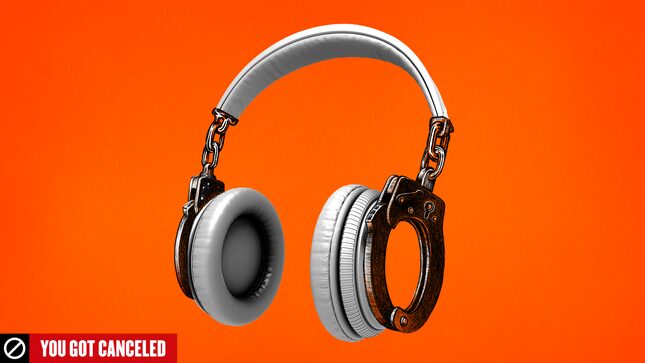
Illustration: Jim Cooke, Photo: Shutterstock
Here are some places I heard Michael Jackson’s music this year, after the two-night run of Leaving Neverland in early March: At a Chili’s in Las Vegas’s McCarran International Airport (“Rock With You”), at a “haunted” indoor mini-golf course in Colorado (“Thriller”), at a friend’s 40th birthday party in a South Jersey bar/restaurant (“Don’t Stop ‘Til You Get Enough”), at the Starbucks across from the G/O Media office (“The Way You Make Me Feel”), in a bathroom at work (“Billie Jean”), in a cab in Barcelona (“Shake Your Body”), during a Barry’s Bootcamp class (a dubstep remix of “Beat It”), in an Uber in Brooklyn (“Bad”), in the Todd Snyder store on Madison Park in Manhattan (“Say Say Say”), before Mariah Carey’s recent Christmas show in Atlantic City (“Give Love on Christmas Day”). Had I heard him at Disneyland when I visited in June (and for all I know, I could have and simply not parsed him out of the Disney sensory overload), you’d have essentially a map of my travels in 2019.
At the beginning of this year, Jackson’s cancellation seemed inevitable. When news broke about Leaving Neverland’s marathon of horrors, in which pedophilic grooming and sexual abuse were alleged by two men who were close to Jackson as boys, I felt put out. I was annoyed I’d have to revise my listening habits as a result of a cultural reassessment of Jackson, a mainstay of my musical rotation for decades no matter where my general taste had otherwise shifted. But all of this hand-wringing was for nothing. Deleting Jackson turned out to be easy; after watching the doc, I lost my appetite for his music completely. There was no struggle, no self-centered agonizing, no sneaking in “Remember the Time” when I didn’t think anyone was paying attention. It felt like a clean break. One day I was a person who listened to Michael Jackson. One day I was not.
But virtually everywhere I went, there he was. According to data, my anecdotal experience was not aberrant. In October, Billboard reported that Jackson’s airplay had indeed dropped this year, though the superstar was hardly persona non grata on the airwaves: In the four weeks leading up to the broadcast of Leaving Neverland on HBO, Jackson averaged 14,000 spins per week at radio, but in the 31 weeks after the airing of the two-part doc (through the week of October 3), he was down to an average of around 11,000 spins. His presence has been reduced, not outright banished. (Keep in mind that because of “Thriller,” Halloween is MJ season, and these numbers don’t reflect the possible holiday uptick in airplay.)
More importantly, though, Jackson’s streams rose this year. If the radio is a democracy-dictatorship wherein the audience (through requests and listener feedback) has nominal say in what the powers that be allow on-air, streaming is the purer democratic metric, a direct indication of demand from listeners. And what they demanded this year was Jackson, whose streams rose 22.1 percent in the 31 weeks after Leaving Neverland aired. (Billboard also pointed out that this figure outpaced the streaming industry’s 21.8 percent growth. By virtue of the fact that more people are streaming, more streams wouldn’t necessarily signify a growing demand for an artist. Jackson’s gains are high enough, however, to suggest a growing demand.)
Nielsen Music provided U.S. streaming data to Jezebel for Jackson and a host of artists mentioned in this piece. Here’s a visual of Jackson’s streams spanning all of 2018 through the week ending November 14, 2019:
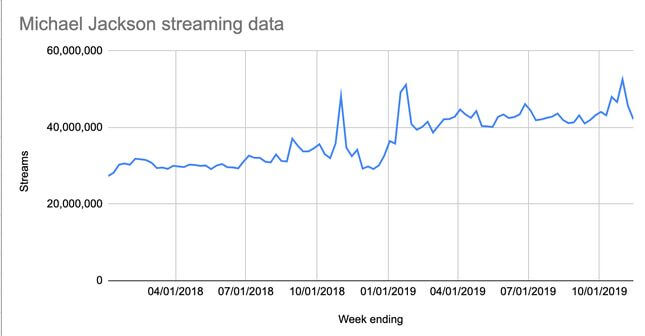
In fact, the documentary had little, if any, impact on Jackson’s streams at all. It aired March 3 and 4 on HBO in the U.S., and later that week in the U.K.
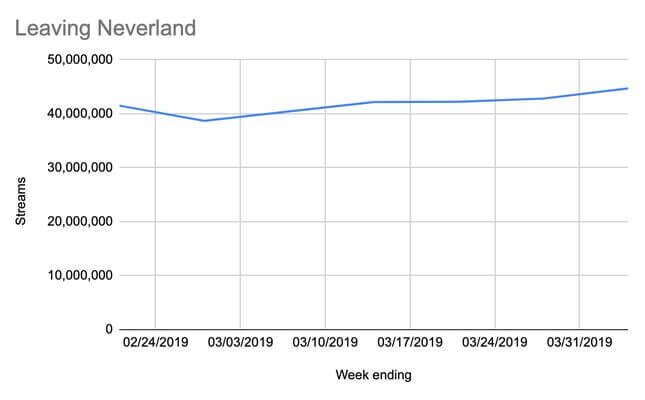
Looking at the raw data of streaming music is enough to expose the conceptual fallacy of ‘cancel culture.’
This effect isn’t an aberration either. This year, and during the ones that immediately preceded it, recording artists accused of sex crimes and other destructive, antisocial behaviors were able to sustain and in some cases launch careers in the wake of the media coverage of the allegations and ensuing scandals. Looking at the raw data of streaming music is enough to expose the conceptual fallacy of “cancel culture.” To subscribe to the notion that the public readily exerts its power to defrock a celebrity is to believe in a black-and-white binary, the absolute polarity of good and bad, the neat societal organization of punished and free. The truth is messier. Those who believe in and decry cancel culture also miss a crucial point: In order to enact its power, the public must have the will to do so.
In fact, there are numerous examples of alleged transgressions seeming to attract audiences, not repel them. Take R. Kelly. His ability to sustain an active career in music despite allegations of sexual abuse of underage girls that go back decades is one thing; that his streams jumped 116 percent the day of the final airing of Lifetime’s Surviving R. Kelly docuseries is quite another. Billboard reported that Kelly’s streams sat at 1.9 million on January 2, the day before the three-day broadcast event that detailed allegations of Kelly grooming and raping underage girls and running a sex cult, among other things. By January 5, Kelly’s streams were up to 4.3 million. In terms of weekly figures, he nearly doubled his streams from about 15.8 million the week ending January 3 to about 30 million the week ending January 10.
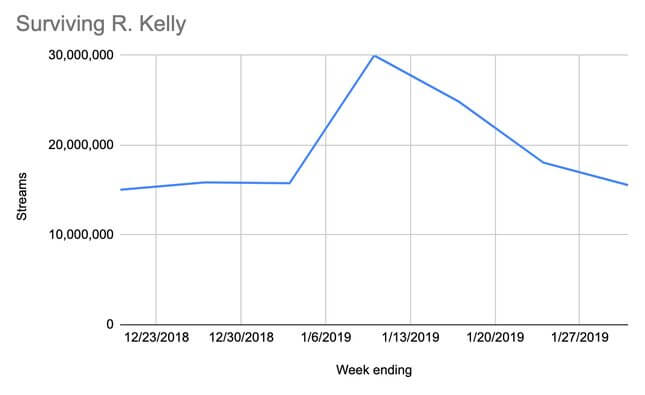
By seemingly any measure, Kelly’s blustering and self-pitying interview with Gayle King was a disaster… except in terms of streams, which rose in its aftermath for several weeks.
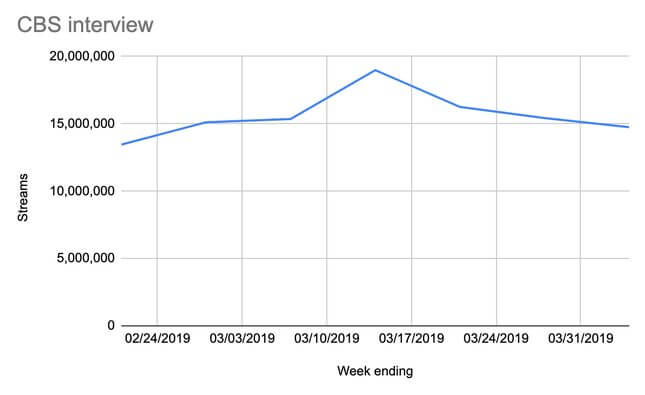
Kelly’s figures have since calmed down—to levels comparable (if slightly higher) to those before Surviving R. Kelly aired.
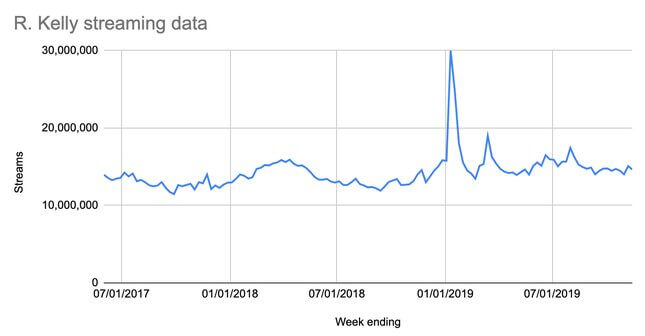
Remember when seven women went on the record in a New York Times report dated February 13, which accused singer-songwriter Ryan Adams of “a pattern of manipulative behavior in which Adams dangled career opportunities while simultaneously pursuing female artists for sex”? At the time, Adams’s weekly streams had been hovering around the 2 million mark (up from an average of 1.5 million weekly streams in 2018), perhaps as a partial result of the widely covered January 8 announcement that he planned on releasing three albums in 2019. After the accusations, Adams’s streams did not keep up the momentum. Through the week of November 14, 2019, he’s averaged 1.3 million streams per week this year, down 16 percent from last year. Though his profile has lessened following the accusations, he has nonetheless retained the bulk of his streaming audience.
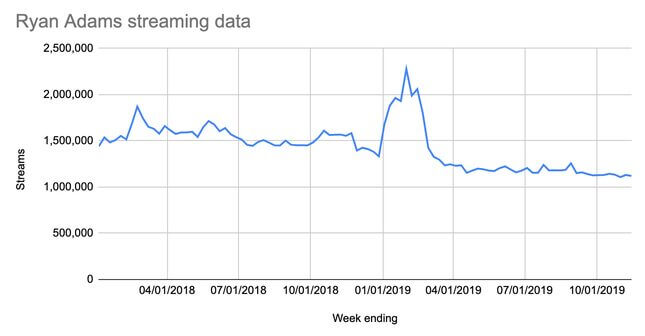
Perhaps the most obvious example of an artist who seemed to benefit directly from being accused of a heinous crime is the 20-year-old Florida-based rapper YNW Melly. Melly’s “Murder on My Mind” had been growing slowly in popularity since he uploaded it to SoundCloud in March 2017. In it, Melly, whose rap sheet includes convictions for assault and firearms, spins a somewhat convoluted story of a “homicide” he perpetuated that initially sounds more like manslaughter (“I didn’t even mean to shoot him/he just caught me by surprise,” he raps) and then, in the next line, turns cold-blooded (“I reloaded my pistol, cocked it back, and shot him twice”). In January of this year, it was certified Gold by the RIAA.
Meanwhile, on October 26, 2018, two members of Melly’s crew, Anthony “YNW Sakchaser” Williams, 21, and Christopher “YNW Juvy” Thomas Jr., 19, were shot and killed, their bodies dropped off at a hospital in Miramar, Florida. The next day, Melly posted a tribute on Instagram that began, “They Took My Brothers From Me Over Jealousy I know y’all watching over me .” On February 13 of this year, Melly turned himself in to police and was charged with two counts of first-degree murder of Williams and Thomas. Another member of Melly’s crew, Cortlen “YNW Bortlen” Henry, was also arrested and charged.
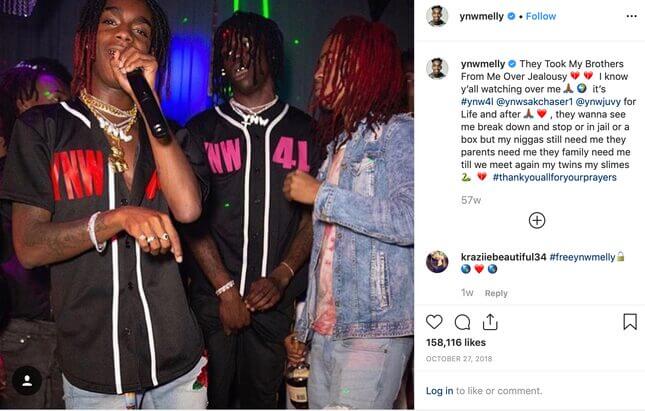
“Murder on My Mind” immediately exploded in popularity. It surged from No. 59 to No. 14 on the Billboard Hot 100 chart dated March 2. It stayed in the Top 20 for six weeks. It is now certified Triple Platinum.
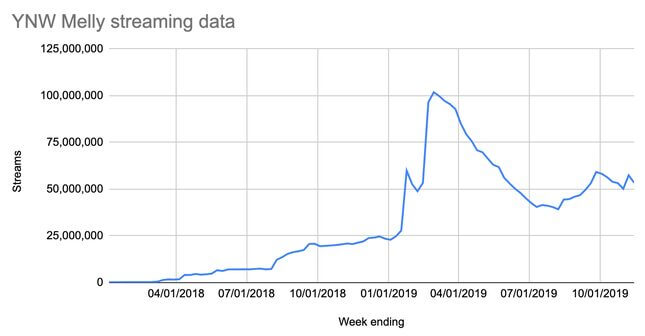
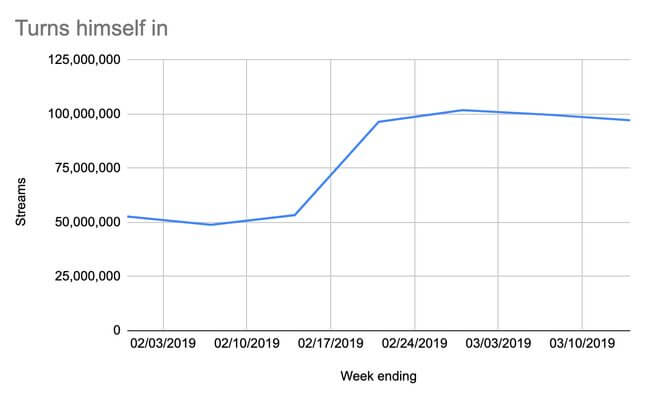
To a certain extent, I understand the appeal. There’s something so viscerally bleak about Melly’s earworm that makes it go down like a promethazine cocktail that might actually kill you. It’s “dangerous,” but in a titillating way. Like a two-by-four hit square to the face, it’s no bullshit. The song, though written well over a year before the deaths of Williams and Thomas, nonetheless offers a glimpse into the fractured mind of an accused murderer, and as such is effectively true-crime entertainment for young hip-hop listeners who generally are not targeted in modern true crime’s marketing.
It is a match made in hell, the song and the accused crime. Police claim that Henry told them Williams and Thomas were killed in a drive-by shooting along Interstate 75 near Miramar Parkway, but that no evidence of such a shooting was uncovered in that area. However, the cops say they have evidence that Henry drove Melly (real name Jamell Maurice Demons, as luck would have it), Williams, and Thomas, to a spot in the Everglades where eight .40-caliber casings were found; cellphone data, police say, tracks Henry and Demons to that spot and the round matched a .40-caliber casing discovered in the backseat of the Jeep where Demons was seated. According to reports, prosecutors plan to seek the death penalty against Demons. I should remind you here that he is 20.The only story that has riveted me more this year is that of Jussie Smollet’s supposed bias attack/supposed hoax. The poptimist philosophy on guilty pleasure tends to regard it as a contradiction; one should not feel guilty about pleasure. But this kind of morbid fascination, very much like that which attracted me so much to Michael Jackson’s HIStory album in the wake of Leaving Neverland, is so strong yet so wrong that it feels compulsive. Factor in the implications of enabling people accused of heinous crimes and it seems that perhaps there are some pleasures people should feel guiltier about.
There’s another tier of artists whose professional resistance to allegations seems to be more circumstantial: A bad-boy mystique may be of some aid to their appeal, but it’s difficult to say whether it has directly affected the data. When Genius broke the news in November 2017 that 6ix9ine had pled guilty to the felony of use of a child in a sexual performance, his single “Gummo” had already been exploding in popularity. The most exact conclusion that can be drawn, then, is that the news did not hinder him. Maybe it was a boost; maybe beginner’s luck coated him with a sort of career Teflon.
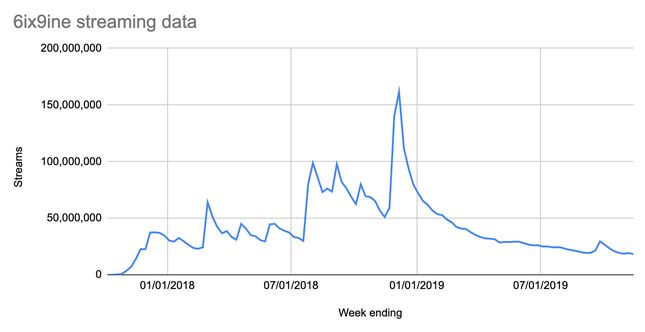
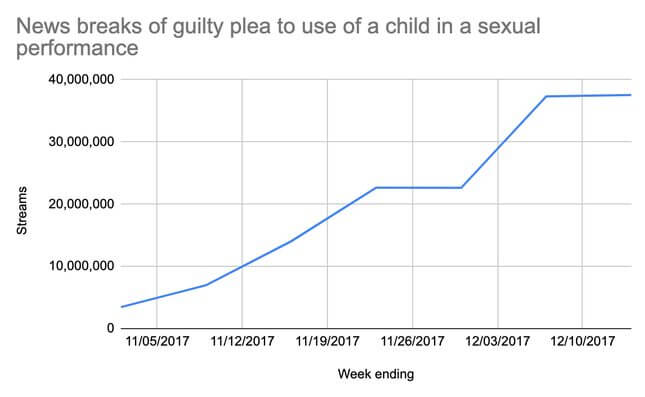
It should also be noted that the decline you see in streams for 6ix9ine this year in the graph of his overall streaming data almost certainly has to do with his not having released anything substantial this year (only two songs, one a feature) because of his imprisonment. Or it could signal the inevitability of his 15 minutes expiring. As I get older, these things get harder to predict, but no shred of 6ix9ine’s existence ever struck me as being that of a “legacy artist.” Regardless, around the time when 6ix9ine made headlines in September 2019 for his testimony as a government witness in the racketeering trial of two of his former associates, his streams spiked:
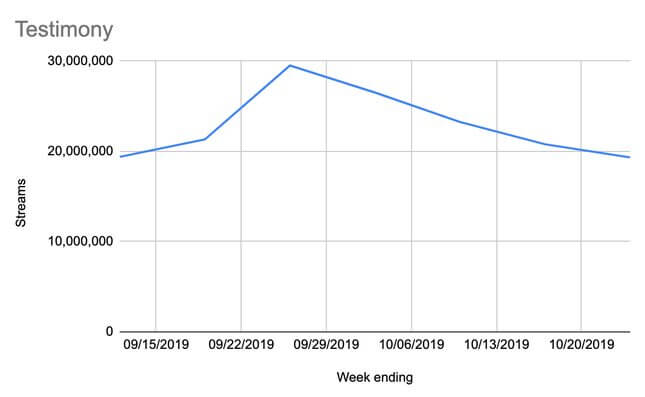
This occurred despite the social media outcry over his “snitching,” which was memeified (and anecdotally, seemed to scandalize people way more than his posting of a video of a 13-year-old being penetrated). Kodak Black, who was accused of raping a woman in February 2016, saw his numbers surge in the ensuing three-and-a-half years.
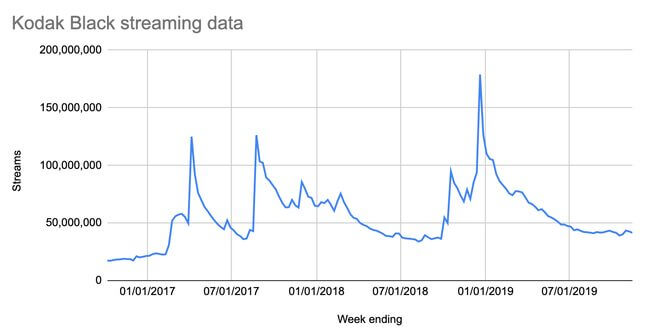
In October 2016, the now dead rapper XXXtentacion was charged with aggravated battery of a pregnant victim, domestic battery by strangulation, false imprisonment, and witness tampering. For many, in the intervening time (and especially as the result of his death), he became a legend. In October 2018, tapes were released of him confessing to domestic abuse.
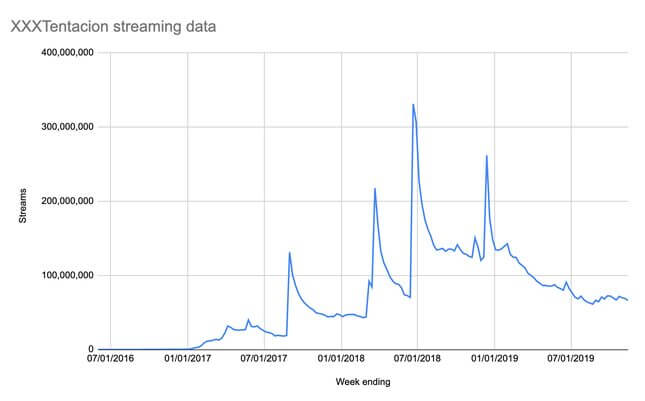
This coincidence of scandal and streams is not just a function of mainstream music; after the electronic musician Gaslamp Killer was accused of rape on Twitter on October 12, 2017, his streams, too, saw an uptick (granted, he’s listened to on a much smaller scale than the rest of the artists mentioned here).
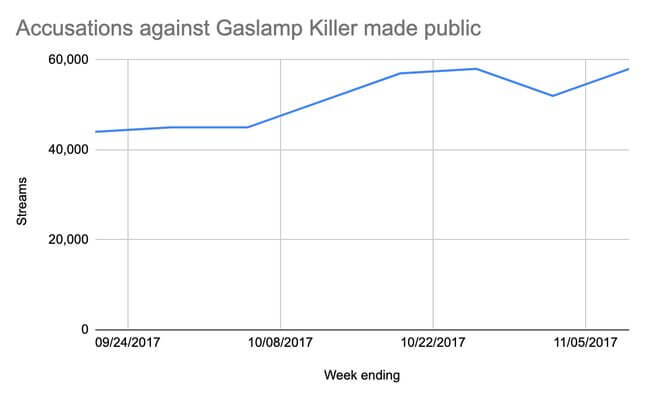
In the time since, however, the streams have waned.
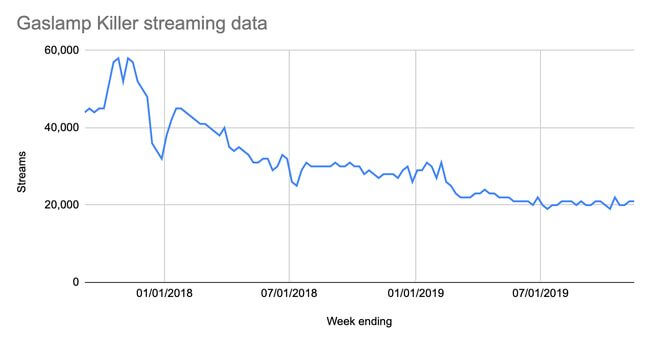
What to extract from this? An indication of general social irresponsibility on the part of music listeners who are at least apathetic (and, at times it seems, enthusiastic) about lining the pockets of men who are accused of doing very, very bad things? An illustration that our culture fully operates by reality TV values, which cherishes misdeeds and admires the entertainer whose life bleeds off the page? Proof that when you have a president who’s spent years getting away with everything, regardless of the allegation, the rest of the country is bound to follow suit? A suggestion of a rather sophisticated ability to separate the art from the artist among contemporary music fans?
A good beat works as a salve; on contact, it can soothe whatever issues its creator may conjure.
Maybe it’s a simple matter of attention. It could be that major news coverage alone is enough to draw people to an artist; when they then enjoy the music (and make no mistake, many of the artists here are objectively gifted), they stick around. If this is the mechanism at work, it illustrates how the adage “all press is good press” plays out in 2019.
Keep in mind, too, that whereas we’ve seen the profiles in Hollywood diminish as a result of institutional decisions like Amazon dropping Woody Allen’s deal or Netflix firing Kevin Spacey, the music industry has been slow to respond. People have been able to stick around. And besides that, a four-minute song is highly accessible and easy to consume compared to an hourlong TV show and or a two-hour movie. Streaming subscriptions are inexpensive, and it’s easy enough to access these streams for free (via nonpaid Spotify or YouTube, for example). Commitment to a particular artist can feel like not very much commitment at all, actually. A good beat works as a salve; on contact, it can soothe whatever issues its creator may conjure.
And so a post-MAGA, post-slavery-was-a-choice, prospective megachurch leader Kanye West thrives (Jesus Is King’s first week out was the fifth biggest streaming week of any album in 2019). With “No Guidance,” Chris Brown returned to the Top 5 of the Billboard Hot 100 this year for the first time since he beat Rihanna’s face so badly that she had to be hospitalized. (That was in 2009.) The music of convicted child rapist Gary Glitter was featured in one of this year’s biggest movies, Joker (albeit not without controversy). Producer Dr. Luke (Lukasz Sebastian Gottwald), accused of raping collaborator Kesha, remains employed and busy, producing many of rising pop star Kim Petras’s songs. When Out.com ran a piece in October advising listeners how to support Petras, who is trans, without supporting Dr. Luke, a commenter astutely noted that to do so was akin to “going into [a] steakhouse and ordering a salad.”
It’s that insidious. Institutional decisions like those of Sony, who dropped R. Kelly a few weeks after Surviving R. Kelly aired, have been too little, too late to make much impact on the fanbase. Spotify reneged on its already flimsy “hate content and hateful conduct policy,” which aimed to punish artists like R. Kelly, XXXtentacion, and Tay-K (whose “The Race” went viral after he was nabbed by U.S. marshals on a capital murder charge in 2017). Spotify proposed banning such artists (“in consultation with rights holders”) and refusing to include them on in-house playlists and other promo tools; the policy was scrapped in less than a month. The backlash to Spotify’s proposed backlash was intense and came from high up. Kendrick Lamar threatened to pull his music in response to what he perceived as Spotify’s attempt at censorship, his label head confirmed. Were Spotify motivated by a sense of social duty and not intimidated by such censorship accusations, booting artists would certainly prove effective: A few weeks after a HuffPost report in April that found at least 21 women had accused Dahvie Vanity, frontman of the electropop band Blood on the Dance Floor, of sexual assault, Spotify removed the band from its service and its streams fell drastically.
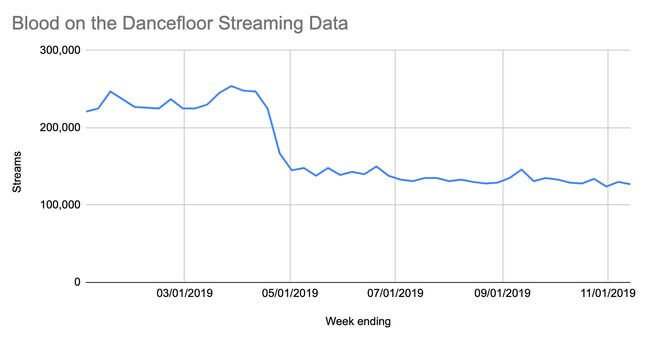
People like what they like, and they’ve never had better means to access it. For many, playing a favorite song is as easy as turning on a faucet. Many young people, who make up the bulk of the respective audiences of many of the artists discussed here, don’t want to sit through scoldings about responsible consumption, or they’re specifically interested in irresponsible consumption because it’s fun and cool and celebrities aren’t real people to them and so many crimes don’t seem like that big of a deal.
As an adult, one of the downsides of maintaining interest in pop music is that it positions you at the mercy of the people’s will. Until you are ready to just give up and be old, you must engage with what is popular, even if it is against your better judgment, because implicit in the belief that popular music is worthy of serious consideration is the notion that a major part of what makes it interesting is its very popularity. In a year when attacking critics and entertainment journalists have become standard practice by artists and the social-media users who stan them, there’s actually never been a more useful time to be someone who examines and interprets popular music on a large platform. You are unlikely to truly shift popular taste—you may not even want to—but in this swell of corrosive behavior and its enabling on a grassroots level, you can at least provide the possibility of a discursive life preserver. At the very least, there are capable and trained eyes to help make sense of all this. It’s cold comfort, but it’s what we have.
(Updated 3/2/22 with new details)